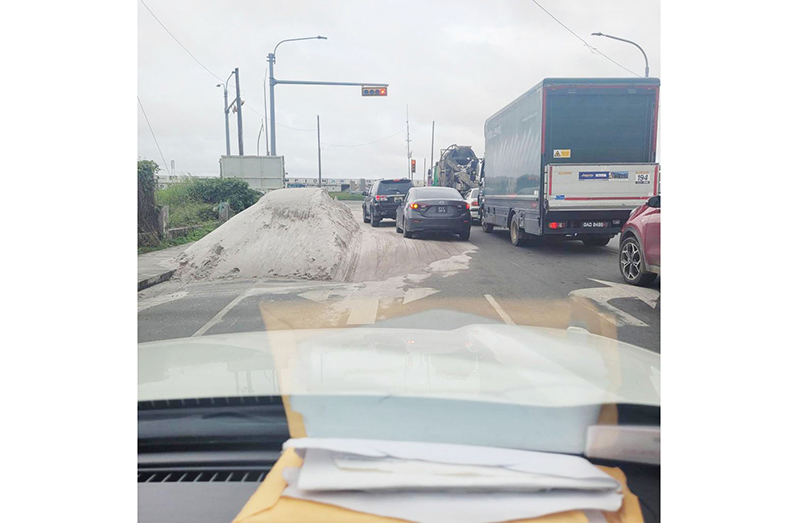-says Minister Edghill
WITH the escalating apprehensions regarding the harm to roads and potential traffic risks resulting from the inappropriate storage of building materials and garbage, the Minister of Public Works, Juan Edghill, has issued a stern warning to the public to refrain from partaking in such conduct.
In a recent interview with the Sunday Chronicle, Minister Edghill explained that he had made it clear to the public that materials such as dirt, sand, stone, blocks, cement, wood, and steel should not be stored on roadways or on the shoulders of the roads for more than 24 hours.
“I understand that our country is developing every day, and our people are investing and constructing buildings daily; however, development should not be at the inconvenience of others.
“Not only is it against the law to disrupt the smooth flow of traffic, but we need to understand that this is a dangerous practice for all road users,” the Public Works Minister said.
While he acknowledged that it is an admirable effort by people to better their communities and add to its enhancement, he emphasised the need for appropriate construction methods and to ensure that the roads and drainage systems do not suffer as a result of these advancements.
“Guyanese are becoming more appreciative of their personal spaces, and that is excellent; they are constructing things to enhance their quality of life. However, they simply cannot throw every truckload of stone and sand into the road without the consideration of others. It doesn’t, nor can it, work like that,” the minister added.
Some of the main issues, according to Minister Edghill, are the dumping of old vehicles on the roadsides, the mechanical work done on the roadways, and the mixing of cement on the roads.

“This type of practice causes damage to the road’s surfaces as well as interfering with the drainage systems which could lead and does lead to water buildups and eventually deterioration of the roads and damages to other people’s properties.”
In order to address these problems, Minister Edghill recommended utilising “ransom” concrete mixers, disposing of all vehicles in a proper manner, and desisting from performing any type of mechanical or similar work on the roadways.
Minister Edghill further asked that people dispose of their garbage and leftovers correctly, rather than letting them sit on road shoulders for an extended amount of time.
Additionally, he stated that adequate drain maintenance and the evacuation of surplus materials once construction is finished should not be overlooked when short-term permits are provided for building operations by local authorities, such as Neighbourhood Democratic Councils (NDCs).
The minister appealed to the public that it is a collective obligation to protect the country’s infrastructure.
“While we understand that people are making improvements to their lives, we are also asking you to let us dispose of our garbage, construction waste, old vehicles, or any other type of material that is of no use to us in the right manner. We are working with you to get this done and get our country clean.
“We must all take pride in that, but we have to maintain that. For the people who do not want to follow these rules and think that they are above the law, we will be serving you notices. Let us hope that you will desist from these practices and teach our future generation by your actions that cleanliness is next to godliness.”
Sometime last year, the Ministry of Housing issued a warning stating that building supplies should not be kept on roadways or on the shoulders of roads.
“There should also be no mixing of concrete on the roads, and the road shoulders and heavy trucks (twin steer, 20 tonnes) are not allowed to drive on them,” the ministry had said.
The ministry also added that they will be monitoring the situation, and anyone found damaging the infrastructure will be fined $10,000 per day. It was also suggested that materials be delivered using smaller trucks. Furthermore, a location directly on the property is needed for the storage of raw materials and the mixing of concrete.
Earlier this year, a 36-year-old Chief Prison Officer died after crashing into a sand heap along the Melanie Public Road, East Coast Demerara (ECD). According to the police, Patrick Perry lost control of his car, PAC 6465, while negotiating a left turn of the road. The car flipped multiple times as it struck a sand mound on the southern parapet.



.jpg)








